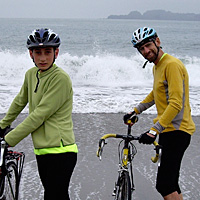At 13, a Jewish boy becomes a man through his bar mitzvah. My atheist son Yonah refused to have one. I insisted that he undergo an alternative rite of passage. In lieu of memorizing a dozen lines of Torah and dancing with his grandmother at the bar mitzvah party, he rode a bike from the Golden Gate Bridge to Washington D.C. with family in tow.
Sisyphus had nothing on us in terms of physical challenges. Cycling fully-laden bikes up the Sierras is slow, but when an ant had the audacity to crawl past us at the summit, we surged and bested it in a wheel-to-antenna photo finish. Every day was hot, usually triple digits. Had Lucifer been with us when the Midwest humidity joined forces with the heat, he would have needed to chug a 55-gallon drum of Gatorade.
Yet day after day, Yonah, whose default is prone on the couch with his head in a book, pedaled. He pedaled over four mountain ranges, across the Great Basin desert and through the Great American Sauna: 3,804 miles. He went from not knowing how to wash his socks to talking dad down from a meltdown on one tough day.
He learned that by breaking the impossible into doable segments, an ordinary person can accomplish the extraordinary.
It's a shame that we moderns have few rites of passages, those physical and spiritual challenges that turn the child into the adult. Perhaps this is the seed of teen angst, years of an uncertain societal status. High school football, risky behavior and the armed services all address the teen need to test one's mettle. Yet, none of these have that finality of ceremony like the bar mitzvah, or the dipping of the front tire in the Lincoln Memorial's Reflecting Pond which all signal the beginning of a new chapter of life. Even an atheist can appreciate the importance of a rite of passage.
